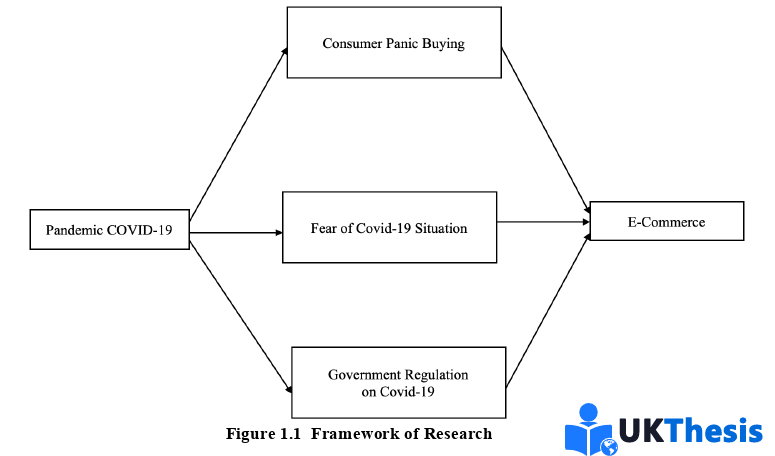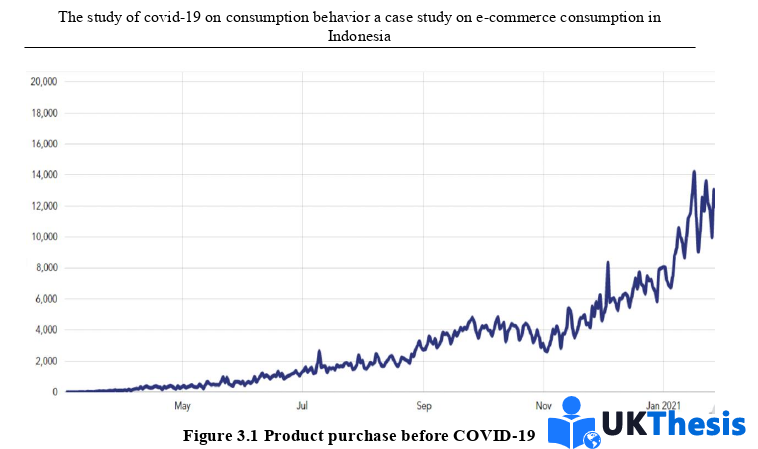代写电子商务论文模板:COVID-19对消费行为的冲击思考——基于印度尼西来电子商务消费案例探讨

本文是一篇电子商务论文,在本研究中,通过问卷调查方法对在COVID-19中受影响的印度尼西亚居民进行采样。本研究有205份问卷作为本研究的样本,使用SPSS 25软件对问卷数据进行处理。
CHAPTER 1 INTRODUCTION
1.1 Background and Significant of Research
At the end of 2019 the world was faced with the COVID-19 which has spread to almost 140 countries in the world and had a major impact on various aspects of life, especially in the economic. COVID-19 affects various aspects such as politics, social, culture, economy, especially business. The emergence of new variants such as Alpha, Beta, Gamma, Delta, Epsilon, Zeta and Eta made the number of victims affected by COVID-19 continues to increase, as does the number of deaths caused by COVID-19. According to the WHO, the COVID-19 outbreak has been classified as a pandemic starting March 11, 2020. People all over the world are still trying to adapt with conditions that require every individual to always follow health protocols. Such as practicing hand hygiene, consistently and correctly wearing a high-quality mask, improving ventilation, and keeping your distance, when possible, from the person who is sick or who tested positive.
Diele-Viegas (2020) showed therefore, quarantine, as well as social and economic isolation, was implemented in several countries, regions, and different economic sectors to curb its further spread. All of economic sectors also experienced difficult times. On the other hand, the advent of COVID-19 has made people pay more attention to cleanliness, health and safety in their daily activities. The population is also cautious when shopping for daily necessities. This pandemic has created a new pattern of behavior throughout the community to adapt to new habits in daily life. People are also trying to avoid contracting the COVID-19 virus by changing their shopping behavior through the use of e-commerce. It is known from previous research that e-commerce is one of the business areas of great interest during the pandemic as the community responds to the conditions caused by the COVID-19 virus.
1.2 Objectives of the Study
The Study was devised to achieve the following objectives:
1. To determine if COVID-19 pandemic increased the use of e-platforms in Indonesia.
2. To examine the Irrational Consumption Behavior (ICB) during the COVID-19 on E-commerce Consumption in Indonesia.
3. To examine the degree of irrational consumer behavior during the COVID-19 pandemic based on the driving factors for consumers’ needs on e-commerce.

CHAPTER 2 LITERATURE REVIEW
2.1 Definition of Consumer Behavior
Rajagopa (2020) analyzed Consumer behavior refers to the study of individuals or groups who are in the process of searching to purchase, use, evaluate, and dispose of products and services to satisfy their needs. According to Khoa (2020) People’s shopping behavior currently provides empirical evidence that people are starting to change their lifestyle from physical activities to virtual or online activities. Wildiyani (2016) explains that consumptive behavior is defined as excessive behavior without regard to rational considerations when purchasing things that are not necessities. Consumptive behavior can occur in all age groups and refers to an increase in the intensity of consumption of goods or services in order to get something new, gain possession satisfaction, or improve one's social status. Consumption behavior indicators can be used to determine a person's consumption behavior.
As stated by Chikhi, K. (2021) Consumer behavior tends to focus obsessively on the purchase of basic necessities, especially those related to virus prevention, such as personal protective equipment and cleaning gels. Rajagopa (2020) analyzed Consumer behavior refers to the study of individuals or groups who are in the process of searching to purchase, use, evaluate, and dispose of products and services to satisfy their needs. According to Khoa (2020) People’s shopping behavior currently provides empirical evidence that people are starting to change their lifestyle from physical activities to virtual or online activities. These changes directly or indirectly required changes in business strategy.
2.2 Rational and Irrational Consumption Definition
2.2.1 Rational Consumption Definition
Rational consumer behavior refers to the decision-making process of consumers in which they weigh the benefits and costs of a product or service before making a purchase. This behavior is based on the assumption that consumers are rational beings who make informed decisions based on their preferences and available information. According to this theory, consumers will choose products that provide them with the greatest utility or satisfaction at the lowest cost. This means that they will compare prices, quality, and other factors before making a purchase. Rational consumer behavior is important for businesses as it helps them understand how consumers make purchasing decisions and what factors influence these decisions. However, critics argue that this theory does not take into account other factors such as emotions, social influences, and marketing tactics that can also impact consumer behavior. Despite these criticisms, rational consumer behavior remains an important concept in economics and marketing.
The characteristics of consumers who are rational are:
a. Consumers will choose goods according to their needs.
b. Goods that consumers choose or buy provide optimal use for consumers.
c. Consumers will buy goods with guaranteed quality.
d. Consumers choose goods whose price is in accordance with the capabilities of consumers.
CHAPTER 3 OVERVIEW OF E-COMMERCE AND COVID-19 IN INDONESIA ........... 24
3.1 Overview of COVID-19 in Indonesia ................................. 24
3.2 Consumer Behavior in Indonesia during the COVID-19 ......................... 26
3.3 E-commerce Development in Indonesia ........................... 26
CHAPTER 4 RESEARCH METHODOLOGY AND RESULT ............................ 29
4.1 Research Design ............................... 29
4.1.1 Population Research .................................. 29
4.1.2 Sample Research ................................... 29
CHAPTER 5 CONCLUSION AND RECOMMENDATIONS ................................ 39
5.1 Research Findings ................................... 39
5.2 Conclusions ................................... 39
5.3 Recommendation ............................ 39
CHAPTER 4 RESEARCH METHODOLOGY AND RESULT
4.1 Research Design

The method used is purposive sampling, the researcher uses own judgment deliberately in selecting sample members who are considered to be able to provide the necessary information or sample units that match certain criteria that the researcher wants, namely Indonesian citizens who use e-commerce during the COVID-19 pandemic. The number of samples for research amounted to 205 respondents. This study obtained data from primary data. Primary data using field research is an investigation through direct observation and questionnaires about consumption patterns of Indonesian society in online shopping (e-commerce). The data was collected by using a questionnaire technique, and the questionnaire as an instrument was distributed online using a google form which can be accessed via email or mobile phone. The results of the collected questionnaires are then administered in SPSS 25 software to obtain the results of this study.
4.1.1 Population Research
The population in this study was people who currently stayed in Indonesia before and during pandemic COVID-19 who have been used e-commerce to meet their daily needs. The questionnaires were distributed in several provinces in Indonesia, so the results are representative of several regions in Indonesia. In Indonesia, the use of e-commerce can occur even in small areas far from the city center.
CHAPTER 5 CONCLUSION AND RECOMMENDATIONS
5.1 Research Findings
This research shows that consumer behavior changed during the COVID -19 pandemic in Indonesia. This consumer behavior is called irrational consumer behavior. The results of this study also show that e-commerce is the preferred place where consumers make their purchases during the period of social distancing.
This can be seen in consumers who are fearful of the COVID -19 virus and choose to purchase essentials such as food, medicine, and health products in bulk through e-commerce. The results also show that consumers will try to buy medicines that can prevent pneumonia during the COVID -19 period. Consumers also continue to buy health products even though the prices are expensive.
The research results also show that consumers in Indonesia are aware that the COVID -19 pandemic is a serious situation, based on the increasing number of deaths during the COVID -19 pandemic.
reference(omitted)